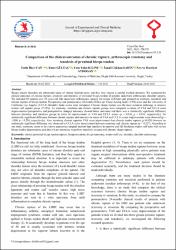Comparison of the clinical outcomes of chronic rupture, arthroscopic tenotomy and tenodesis of proximal biceps tendon

View/
Date
2022Author
Can, Fatih İlkerGültaç, Emre
Kılınç, Cem Yalın
Şahin, İsmail Gökhan
Aydoğan, Nevres Hürriyet
Metadata
Show full item recordCitation
Can, F. İ., et al. "Comparison of the Clinical Outcomes of Chronic Rupture, Arthroscopic Tenotomy and Tenodesis of Proximal Biceps Tendon." Journal of Experimental and Clinical Medicine (Turkey), vol. 39, no. 3, 2022, pp. 728-732. doi:10.52142/omujecm.39.3.26.Abstract
Biceps tendon disorders are substantial cause of intense shoulder pain, and thus they require a careful medical attention. We compared the clinical outcomes of chronic rupture, tenotomy and tenodesis of proximal biceps tendon of patients underwent arthroscopic shoulder surgery. We included 98 patients over 50 years-old who underwent arthroscopic surgery for rotator cuff tears and grouped as tenotomy, tenodesis and chronic rupture of biceps tendon. Preoperative and postoperative 24-months follow-up Visual Analog Scale (VAS) score and the University of California–Los Angeles (UCLA) Shoulder Scale scores were compared. Chronic biceps rupture was the most common pathology in massive rotator cuff rupture group (75.9%). As tenotomy, tenodesis and chronic rupture groups were compared in terms of VAS and UCLA score improvements (preoperative and postoperative change); tenotomy showed better outcomes and there was a statistically significant difference between tenotomy and tenodesis groups in terms of improvements in VAS and UCLA scores (p = 0.036, p = 0.010, respectively). No statistically significant difference between chronic rupture and tenodesis in terms of VAS and UCLA scores improvements were observed (p = 1.000, p = 0.250, respectively). Also, tenotomy showed superior VAS score improvement than chronic tendon rupture (p=0.024) however no statistically significant difference was observed in UCLA score improvement between tenotomy and chronic rupture (p = 0.527). According to our study, tenotomy seems to be a more appropriate surgical method than tenodesis in massive and full-thickness rotator cuff tears with severe biceps tendon degeneration, and also it is not necessary to perform tenodesis in cases with chronic biceps rupture.
Source
Journal of Experimental and Clinical Medicine (Turkey)Volume
39Issue
3URI
https://dergipark.org.tr/en/download/article-file/2240476https://hdl.handle.net/20.500.12809/10418

















